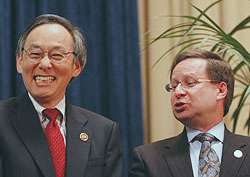Berkeleyan
 The dais was packed with legislative, business, and academic leaders as the funding of a new, multidisciplinary Energy Biosciences Institute was announced to a full house of media and dignitaries. Flanking Chancellor Robert Birgeneau (speaking) were, from left to right, California Senate Minority Leader Dick Ackerman, Senate President Pro Tem Don Perata, BP America head Robert Malone, Illinois Gov. Rod Blagojevich, California Gov. Arnold Schwarzenegger, UC President Robert Dynes, UIUC Vice Chancellor for Research Charles "Chip" Zukoski, LBNL Director Steven Chu, and BP Chief Scientist Steven Koonin.(Steve McConnell photo) |
Berkeley, LBNL, Illinois join forces with BP
Energy giant selects research partners to identify and develop carbon-neutral fuel sources in a multidisciplinary challenge Chancellor Birgeneau calls 'our generation's moonshot'
![]()
| 08 February 2007
If star power were convertible to energy, last week's announcement of Berkeley's new $500 million strategic partnership with oil giant BP could have electrified the campus for days - which, in a figurative sense, it did.
Gov. Arnold Schwarzenegger's celebrity may have shined brightest on Thursday, Feb. 1, at Clark Kerr Campus, but he played a largely supporting role in an onstage celebration that featured appearances by the governor of Illinois, two top leaders of the California Legislature, UC President Robert Dynes, Berkeley Chancellor Robert Birgeneau, Lawrence Berkeley National Laboratory Director Steven Chu, a vice chancellor from the University of Illinois, and both the president and the chief scientist of BP America.
Their audience included Mayors Tom Bates of Berkeley and Ron Dellums of Oakland, Lt. Gov. John Garamendi, state Assemblymembers Sam Blakeslee and Loni Hancock (all, except Hancock, Berkeley alums), a who's who of campus administrators and faculty members, and more reporters, photographers, and TV camera crews than are strictly necessary to confer the imprimatur of major significance.
"We are not waiting for a clean-energy revolution," proclaimed Schwarzenegger, who recently signed a landmark bill aimed at cutting the state's carbon-dioxide emissions 25 percent by the year 2020. "We are the leaders in that revolution."
"This," declared Birgeneau, "is our generation's moonshot."
Generating the excitement was BP's decision to enter into a 10-year agreement with the campus, LBNL, and the University of Illinois at Urbana-Champaign to create the Energy Biosciences Institute (EBI), a far-reaching, multidisciplinary research effort to develop new, carbon-neutral energy sources and reduce the impacts - on both the global environment and the nation's security - of America's voracious energy appetite, in particular its strong predilection for fossil fuels.
The EBI will host some 25 research teams - the majority of which will be housed on campus and at the lab, with the rest located in Illinois - and focus on developing technologies for converting biomass to biofuel, which could then be marketed either by BP or other energy companies. Initial efforts are expected to concentrate on improving processes for production of ethanol via so-called "cellulosic" techniques to break down various plant materials into their sugar building blocks. (The nation's ethanol supplies currently rely on corn.) Future research is likely to turn to biotech production of other energy sources, such as butanol and hydrocarbon fuels.
The project will also have a social-sciences component, with a "social interactions and risks laboratory" devoted to studying such questions as the role of citizen participation in planning and decision-making, "the evolving regulatory framework and societal response to genetically modified organisms," and public understanding of biofuel technologies.
The institute, said Graham Fleming, a professor of chemistry, LBNL's deputy director, and Berkeley director of the California Institute for Quantitative Biomedical Research (QB3), which spearheaded the proposal for BP funding, "is not going to have any vested interest in a particular outcome" but will "draw on the best science and information to come up with an unbiased analysis of where the opportunities are, what the problems are, and then what the solutions to those problems are."
The aim, he added, is to ensure that "we have seen the whole picture" and can "balance the various approaches on a rational basis."
Said Chu: "We believe EBI will create a culture where vibrant, interpersonal interactions will generate extraordinarily innovative energy research. The 'team science' approach introduced [at Berkeley] by E.O. Lawrence 75 years ago and the invention of the transistor at Bell Labs are striking examples of how large-scale, multidisciplinary problems were solved by establishing the proper scientific culture where the most brilliant minds can work together."
Indeed, the notion of "Big Science" was a key reason BP officials decided to cast their lot with Berkeley. In October the global energy firm invited five leading research institutions - Berkeley/LBNL, UC San Diego, the Massachusetts Institute of Technology, Cambridge University, and Imperial College London - to submit proposals for such an institute. Berkeley, already a leader in synthetic biology, partnered with the University of Illinois, which brought to the table added expertise in genetics, agronomy, and sustainable agriculture.
 LBNL Director Steve Chu and BP Chief Scientist Steven Koonin react with good humor to a remark from the podium at last week's announcement event. (Peg Skorpinski photo) |
Dynes, in a post-conference interview, pointed to the UC system's California Institutes for Science and Innovation - a private-public partnership comprising four multi-campus research centers, including QB3 and CITRIS - as a model for the EBI.
"It is my belief that we're reinventing the research university in these kinds of government-public-private partnerships," said Dynes, who - like both Chu and Birgeneau - is a veteran of Bell Laboratories. "Government is part of this partnership as well, as you heard today. And it's not only research laboratories. This place will be teeming with students, who are learning to be creative in the process. If we didn't have students in this, we wouldn't do it."
"The real key," added Dynes, "is that the University of California is large, it's public, and we can bring the intellectual resources from all our campuses together. I often talk about 10 campuses, one university. We can bring these intellectual resources to an issue, to a problem, in a way which is unique.. We have expertise on many campuses that will be part of the drive to deliver this."
The EBI is expected to launch this summer, housed temporarily in Calvin Lab and Hildebrand Hall. It will move eventually into permanent headquarters, to be built with the help of $70 million pledged by Schwarzenegger and the state Legislature.
Dynes' mantra: R, D, and D
BP claims worldwide assets of more than $200 billion, with more than $3.5 billion in California. The British-based firm is the state's leading gasoline marketer and operates its largest refinery. It says it was "the first major energy company to acknowledge the need for precautionary action to reduce greenhouse-gas emissions," and has announced plans for a $1 billion hydrogen-fueled power plant to provide energy for parts of Southern California.
Many details of the new relationship have yet to be worked out, including precisely how research findings will be shared, though officials said the EBI would perform both basic and applied research. The institute will have a governing board made up of representatives from each of the entities involved and directed by a Berkeley faculty member.
John Oakley, chair of UC's systemwide Academic Senate, cited the recent push to replace incandescent light bulbs with long-lasting, energy-saving compact-fluorescent bulbs - the technology for which, he added, "was invented at Lawrence Berkeley Lab."
"There are appropriate concerns about intellectual property and who's going to make money," Oakley said. "But what's important about compact-fluorescent technology is not who's making money off of it but the fact that it's there as an alternative."
"My mantra on this," said Dynes, "is that we do research, development, and delivery. And we must oversee each piece of that. In the delivery part, it's important for us to look and decide who can work with us best to deliver. If it's a private company, so be it. Our drive is not to make money - our drive is to get the benefits of our work to society."
"The work that's done together is jointly owned," he added. "The work that they do by themselves - because they're in proximity, or they get first peek at it, or whatever - is theirs. The work that we do is ours."
The news conference to announce the new institute came just one day before the U.N.'s Intergovernmental Panel on Climate Change released a devastating report concluding that global warming is "unequivocal" and caused largely by human activity.
"We don't have time to wait on energy," said Oakley. "It's not just global warming. It's global conflict that's 25 years down the line."
"Combining our world-class expertise in the area of alternative-energy research and policy with BP's ambitious vision for the EBI," said Birgeneau, "will harness the most creative science and innovative technologies to develop viable solutions to global energy challenges.
"With tremendous support from Gov. Schwarzenegger and the leadership of the California Legislature," he added, "we are enormously excited at the possibility this partnership holds for solving one of the most fundamental problems that currently faces our nation and the world."



